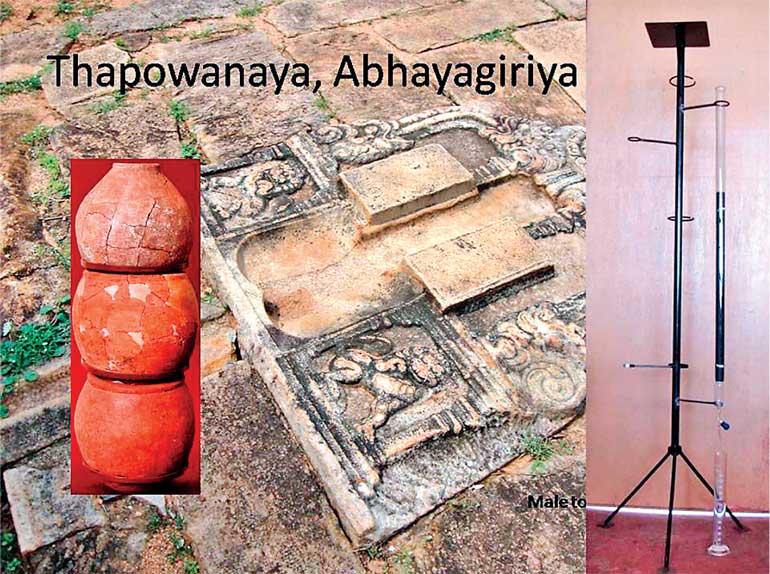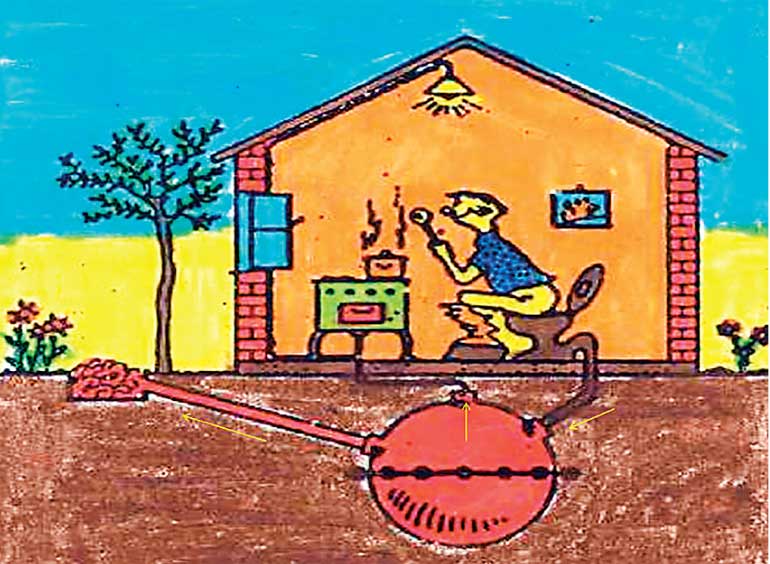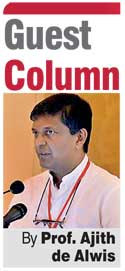Friday Feb 20, 2026
Friday Feb 20, 2026
Thursday, 25 February 2016 01:04 - - {{hitsCtrl.values.hits}}
It may be that a good morning is not quite good if one cannot let go of the waste load and the morning ritual of cleansing is an essential element of daily life. Depending on the way in which you carry out the task, you may identify yourself either to be civilised or living in a developing country – i.e. the ‘civilised’ extent being deduced from that simple act.
It is interesting to contemplate how these particular environs have changed in cities and in homes across countries over time. The function always takes some time and the compulsory expenditure of time may be made more productive while one is engaged. Of course the nature of the environs definitely will contribute to this possibility of enhanced productivity. I envy and respect the architect who in good old British toilets have added a bookshelf to the space by design!
In 1326 London there was a record of an ill-fated labourer by the name of Richard the Raker who drowned in human shit having fallen into the cesspool. The 1854 London reports of it being a city of scavengers with the job titles of bone-pickers, night-soil men and sewer hunters. How much distance the British had moved on.
 IDB presentation
IDB presentation
Railway’s act of apartheid
It was painful to read recently in Sri Lanka a news story titled ‘Freedom flushed down railway’s toilet’ – we are having to create different toilets for visitors as we ourselves are not quite good in using the services and it would be quite disastrous if we are to be seen as a crowd that simply cannot understand how this function can be carried out cleanly and with dignity.
The Railway Department’s act of apartheid over the use of toilets has come in as many of the locals are supposedly do not use the facilities in a decent or clean manner. Why it is painful to read is because we probably pioneered and showed earlier a quite advanced way of not only carrying out the task but also taking steps in ensuring that we do care about the subsequent impacts to the environs when we collectively achieve the relief of relieving the load plus act on mitigating the impact from the discharge of the load.
Archaeological evidence from Abayagiri monastery at Anuradhapura are testimonials of what we did in 2nd century BC! The mechanics of sanitation give an important identity to society.
Current contraptions and consequences
It was in on such an occasion in the morning that I focused on the process itself and considered the developments that had gone in before for all of us to take the current contraptions as standard, must-have elements. I was also considering the process and knew that most of us in Sri Lanka try to get rid of the ‘unwanted’ as quickly as possible and no second thought of subsequent consequences nor what is possible if we rework on the mechanics of doing.
This getting rid of waste in haste without a second thought while using a considerable quantity of chlorinated clean water pumped over a quite a distance by us are causing some issues though we fail to contemplate over such. As we flush down happily some are polluting neighbours’ wells because we have not kept the minimum separating distances between a well and the septic tank due to so many changes that we do to our small plot of land when we build our houses.
Again in urbanisation, without the usual amenities of sewers, septic tank still rules the day for us. Sewers are only available to about 45% of the Colombo population and sewers are simply absent in many cities. Where we have sewers, the sewers are simply connectors to the sea and Colombo has two outfalls. There is no sewage treatment in place and it is an absolute flush direct to the Indian Ocean.
The food habits of the inhabitants may titillate the taste buds of the marine life who will react gleefully to the contents stemming from our urbanised diet and living. However, our own beaches suffer from the continuous pumping of waste. Not a happy scenario to contemplate while fixed to one position.
 Colombo garbage
Colombo garbage
Closing the waste loop
I remembered that one could be completely benefitting from one’s activities even if it is waste disposal by not thinking of waste as waste. A cartoon from Thailand simply depicts the act and the potential of energy and food from biowaste. Now working to close the loop for a single person may be too boring for the quality of life of that individual but the lesson is that biowaste if creatively managed to get energy and fertiliser, the existing possibility of enormous potential via the re-entering to the productive cycle again. Our toilet manners modified could lead us to the circular economy.
My thinking also reminded me what I read in this very paper recently (Daily FT, 9 November 2015). Power from human waste could light millions of homes was the news item and the news item stemmed from a report published by the United Nations Institute for Water, Environment and Health. In this world growing up with resource constraints the new mantra is on resource recovery and what a better way than starting from the toilet itself!
The comment of the UN-INWEH Director, Zafar Adeel, is quite relevant: “When it comes to creating misery and poverty, human waste mismanagement has few rivals.” Though not quite bad from a short-term perspective, we still are mismanaging this waste I thought to myself with the contemplation of the current scenario.
He throws the challenge of a simple cost-effective new approach in a low-resource setting to harness the benefit from the waste. In  my view he should not think of this opportunity not only from a solution to poverty alleviation for a group of people but understand with proper integration and design much more benefits can be accrued right across all societies.
my view he should not think of this opportunity not only from a solution to poverty alleviation for a group of people but understand with proper integration and design much more benefits can be accrued right across all societies.
Well, the first ‘Poo Bus’ running in UK in Bath uses the biogas generated from the sewage treatment plant where all the city’s toilets would be collectively discharging. UNU-INWEH report calculates for the one billion people around the world who defecate in the open the potential with capture to be electricity for 10 million to 18 million households! When the waste loop is closed, how much additional issues can be avoided should be obvious to the discerning reader.
The Gates challenge
That there are even more opportunities are clearly shown by the interest shown by the Gates Foundation. Bill and Melinda Gates have challenged some time back the redesign of the toilet. There grant offer was to redesign toilets to develop cheap, waterless toilets so as to generate energy and recover water and nutrients.
Their expectation was to drive the development of such toilets to reduce the number of children who die of diarrhoea each year, which can be as high as 1.5 million. Some pretty exotic pathways have been tried out. The idea matches that in Germany where there is the interest in capturing nutrients especially phosphorus from urine to realise national requirements!
I have seen the transformation from the open pits to Toilet 2.0 in the Gates challenge designs. However, time has its limits and it is time to flush and come back to reality. However, the scenario that flashed across cannot be ignored as I know that what we are currently doing and supposedly quite civilised is not a valid action any more as the time moves. Sri Lanka too should be considering the Gates initiative to look at the Version 2.0 for the local system. The Gates strategy is to redefine or reinvent the toilet and the new operating system requires going circular in deed and in thinking.
Walking backwards
It is of no use questioning the Railways Department. We should be questioning ourselves on how are we managing to walk backwards. Inventing the flush toilet and with the valve system to the cistern (i.e. Mr. Crapper and his patents from UK) along with underground sewers, the British gave a whole new definition to the process of urban sanitation.
In Sri Lanka we are left with archaeological evidence of some superior systems but having left behind the inventive streak what stares at us today even from a simple railway platform is locked doors of toilets with a message ‘Tourist Toilet’. I need to flush again!